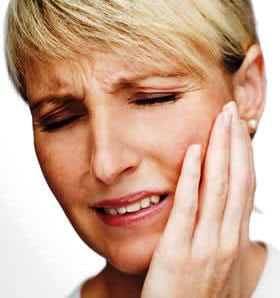I’ve been giving riding lessons for the past ten years. I always wear my helmet and observe all safety rules around horses. Two weeks ago, however, my six-year-old Paint gelding hit me with his head while shaking off flies. He’s usually very gentle; I know he wasn’t trying to be aggressive at all. The left side of my face took most of the blow, and since my teeth and nose weren’t injured or bloody I thought I was okay and nothing had happened. Besides a small bruise that took about a week to go away, I was fine. I figured that was that. Now I’m beginning to develop a lot of soreness and stiffness in my jaw joints, mainly the left side. It’s more pronounced when I first wake up in the morning, or after eating something chewy. My husband says I should see a dentist to make sure I haven’t permanently ruined my jaw joint, but I keep thinking it’ll go away on its own. Is this related to the injury from my horse? Should I listen to him and come in?
Many thanks,
Dee
Dear Dee,
First, kudos to you for your attention to safety! Horses are large, powerful animals and people often underestimate their strength. It’s good to see that you observe and model helmet use and other safety parameters for yourself and your clients. Second, you may want to listen to your husband. He’s correct in urging you to be seen. There may be complications that time alone cannot handle and these would be best addressed by professional care. Even if no visible damage is done, there may be issues that might not be immediately apparent as trauma can be one of the primary causes of TMJ Disorder. Let’s expand upon this:
The Sooner The Better
With any joint damage, getting seen sooner is always the better. Your chances of successful, as well as shorter, healing times are much greater if you are seen within the week, so you may not want to delay any further.
What To Do Initially
Directly following an injury to the face or jaw, it’s best to apply ice to the area to control swelling and call your doctor or dentist. Hold the ice packs against your face for no more than 10 minutes at a time, with 10-minute intervals in between, to allow the skin to rest and warm up again. You may also wish to gently wrap a bandage around the face to minimize movement while you wait to be seen.
There May Be A Fracture
The affected area should be x-rayed as soon as possible to assess for damage to the teeth/root systems as well as dislocation or fractures of the jaw, even if your teeth themselves feel fine. Severe fractures likely require surgery, while minor ones may at times heal without intervention. Some indicators of a break in the jaw are: a numb sensation, swelling, pain and/or stiffness especially when eating/chewing, and bruising.
It May Be Sprained
Another possibility is a sprain and/or strain to the muscles and ligaments surrounding the joint. These may take a fair amount of time to heal and there are various options available to you in the treatment of this condition. You may be prescribed pain relievers, muscle relaxers, and an anti-inflammatory. Sometimes an appliance is prescribed or physical therapy unique to the jaw.
Come For A Complete Examination
Your examination will shed light on the unique complexities of your condition and the best treatment going forward and get you “back in the saddle” once more! Until then, enjoy your equine buddy and give him an extra apple or two.
This blog is brought to you by Hoffman Estates Dentist Dr. William Becker.

